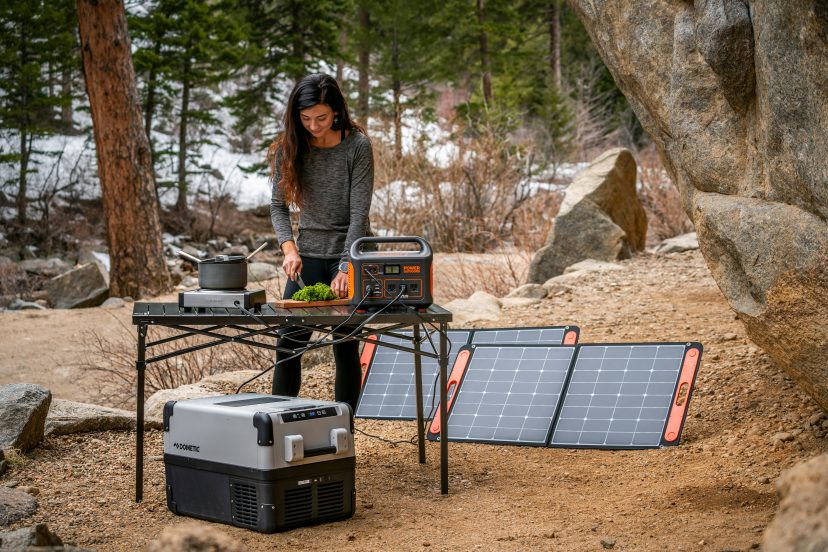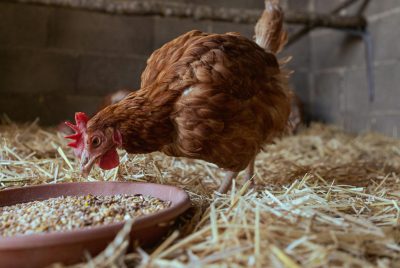Best Solar Generator for Off-Grid Living in 2025
We may earn a commission for purchases made using our links. Please see our disclosure to learn more.
Off-grid living has advantages such as independence, tranquility, and freedom. However, the peace can transform from calm to tense as soon as the sun sets and your homestead’s power supply is cut off. You’re not the only one who has ever been worried about your irrigation system, ability to charge tools and lights, or freezer full of organic vegetables. It becomes important to choose the best solar generator for off-grid living; it is no longer optional. Without depending on loud, fuel-guzzling generators, you can preserve comfort, safety, and productivity with the right solar setup.
Why You Need a Reliable Solar Generator
Living off the grid puts your independence to the test, let’s face it. Every day presents new difficulties, such as shifting weather patterns and equipment failures. As your silent companion, a solar generator converts sunshine into stored energy to maintain the smooth operation of your property.
Traditional fuel-based generators come with drawbacks: constant refueling, noise pollution, and emissions that clash with sustainable living. On the other hand, solar generators offer a renewable, eco-friendly power source that can run essentials like refrigerators, lighting systems, water pumps, and even power tools—all without constant maintenance or fuel worries.
And when integrated into a larger self-sufficient system, a solar generator ensures that your stored harvest stays fresh and your daily tasks remain uninterrupted.
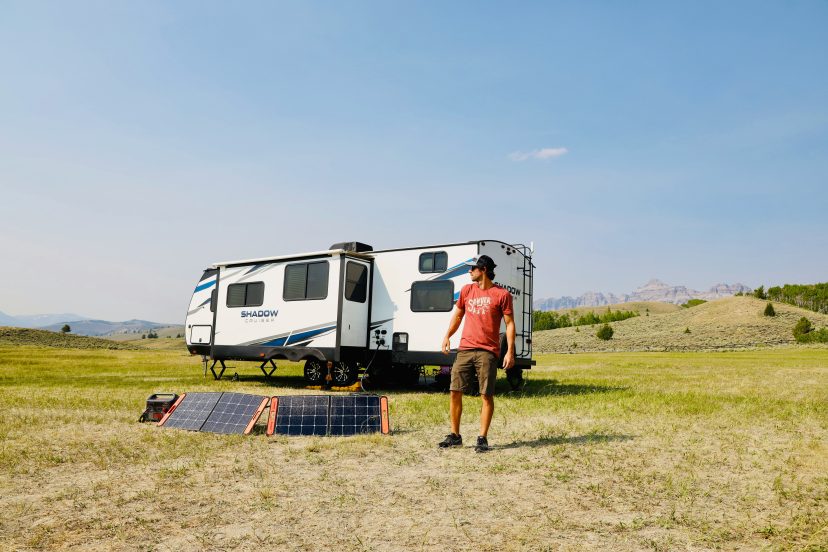
What to Consider When Choosing the Best Solar Generator
Choosing the best solar generator for off-grid living starts with matching capacity, output, and charging speed to your daily loads. Before you rush to buy, it’s important to understand that not all solar generators are equal. You’ll want to look beyond fancy marketing terms and focus on specifications that truly matter for off-grid living.
Capacity and Output (Watts and Watt-hours)
The most important numbers are watts (W) and watt-hours (Wh). Watts measure the power output—how much energy the generator can deliver at a single time—while watt-hours measure the energy storage capacity.
For instance, a 2000Wh solar generator with a 2000W output can run a refrigerator (approx. 150W) for several hours, plus lighting and small tools simultaneously. If you plan to power large appliances, water pumps, or multiple systems at once, aim for a generator above 3000Wh.
Charging Speed and Options
A good solar generator offers multiple charging methods—solar panels, AC wall outlets, and even vehicle charging. During cloudy seasons, you’ll appreciate having options. According to the Solar Generator Guide by Palmetto, units with multi-input ports can charge up to 80% faster than single-source systems, providing flexibility for unpredictable weather conditions.
Durability and Longevity
Off-grid environments can be harsh. Whether your homestead is tucked in the woods or spread across open plains, your generator should handle dust, rain, and temperature changes. Lithium iron phosphate (LiFePO₄) batteries are considered the best for long-term use, lasting up to 10 years or 3000+ cycles.
A WHC Solar report highlights that LiFePO₄ batteries not only provide stability but also resist overheating—making them ideal for remote, unsupervised setups.
Portability vs. Permanence
Ask yourself: Do you need a stationary system for full-home backup or a portable power station you can move between locations? Portable units are great for small cabins or camping use, while stationary setups like the Bluetti EP760 or EcoFlow DELTA Pro are built for permanent homestead integration.
Integration with Your Homestead Systems
If you’re using your generator to support food preservation, climate control, or root cellars, choose one with consistent output and expandability. The ability to add extra battery packs or link solar panels gives you room to grow as your needs evolve.
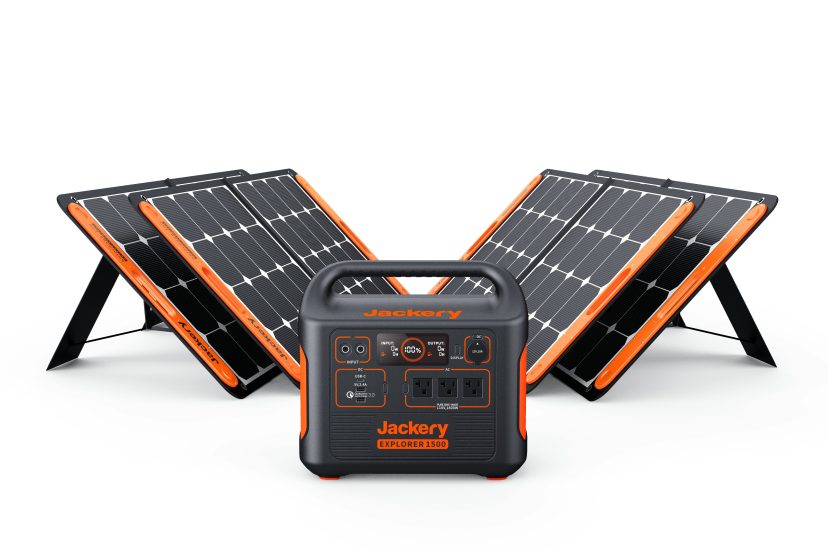
Top 5 Solar Generators for Off-Grid Living
To help narrow your search, here are five trusted models that balance performance, price, and reliability for homesteaders.
1. Jackery Solar Generator 2000 Plus
The Jackery Solar Generator 2000 Plus is a powerhouse for serious off-grid setups, offering an impressive 2042Wh capacity and 3000W output. Designed for homesteaders who need consistent, heavy-duty performance, it can handle everything from refrigerators and water pumps to high-demand tools. Its LiFePO₄ battery ensures long lifespan and stability, while dual solar inputs speed up recharging during daylight hours. Compact, quiet, and app-controlled, the 2000 Plus delivers robust, clean power for full-time off-grid living or extended outages.
2. Jackery Solar Generator 1000 Plus
Built for flexibility and portability, the Jackery Solar Generator 1000 Plus delivers 1264Wh capacity and 2000W peak output, making it ideal for small homes, cabins, or emergency backup. It’s lightweight yet powerful enough to keep essential devices like lights, fans, or small fridges running for hours. With its fast solar recharging and ultra-quiet operation, it’s the perfect balance between power and convenience for weekend homesteaders or those transitioning into off-grid living.
3. OUPES 2400 Portable Power Station
The OUPES 2400 brings both affordability and strength to off-grid power systems. Offering 2232Wh capacity and 2400W output, it supports multiple devices simultaneously—from kitchen appliances to garden tools. Its pure sine wave inverter ensures stable electricity for sensitive electronics, and the LiFePO₄ battery delivers over 3,500 charge cycles for long-term reliability. Combined with solar compatibility and multiple outlet types, it’s a practical option for budget-conscious homesteaders seeking dependable off-grid power.
4. Anker SOLIX F2000 Portable Power Station
The Anker SOLIX F2000 is built for durability and endurance, featuring a 2048Wh capacity and 2400W output with surge protection. Its InfiniPower™ technology combines LiFePO₄ batteries, industrial-grade components, and smart temperature control for long-lasting performance. With built-in wheels and handles, it’s portable despite its size, making it great for mobile homesteads or outdoor workshops. This model can power high-demand tools, kitchen appliances, or multiple systems simultaneously—ideal for those seeking a reliable, long-term energy partner.
5. EF ECOFLOW DELTA 2 Max
The EF ECOFLOW DELTA 2 Max delivers 2048Wh capacity and 2400W output, offering one of the fastest recharging systems in its class. Reaching 80% charge in under an hour, it’s built for responsiveness and flexibility—perfect for off-grid homesteaders who can’t afford downtime. With expandable battery modules, solar input up to 1000W, and app-based energy tracking, it provides efficiency and control in a compact package. Quiet, safe, and highly efficient, the DELTA 2 Max is an all-around off-grid powerhouse.
Product Comparison Table
These picks represent the best solar generator for off-grid living options for homesteaders who need reliable, expandable power.
| Model | Capacity | Output | Battery Type | Expandable | Best For | Key Advantage |
| Jackery Solar Generator 2000 Plus | 2042Wh | 3000W | LiFePO₄ | Yes | Full off-grid homes | Heavy-duty, smart-controlled system |
| Jackery Solar Generator 1000 Plus | 1264Wh | 2000W peak | LiFePO₄ | Partial | Small cabins or backup | Fast solar recharge, ultra-quiet |
| OUPES 2400 Power Station | 2232Wh | 2400W | LiFePO₄ | Yes | Mid-sized homesteads | Reliable and budget-friendly |
| Anker SOLIX F2000 | 2048Wh | 2400W | LiFePO₄ | Yes | Workshops & mobile setups | Rugged, long-life InfiniPower tech |
| EF ECOFLOW DELTA 2 Max | 2048Wh | 2400W | LiFePO₄ | Yes | General off-grid use | Fastest recharge, smart app control |
The Benefits of Solar Generators for Homesteading
For homesteaders, the benefits go beyond convenience. Solar generators empower a lifestyle of sustainability and resilience.
- Energy Independence: No reliance on grid infrastructure or fossil fuels. You generate your own power directly from sunlight.
- Eco-Friendly and Quiet: Solar systems emit no fumes and operate silently—a big win for both nature and neighbors.
- Low Maintenance: With minimal moving parts, solar generators require almost no upkeep compared to fuel-powered alternatives.
- Cost-Effective Long-Term: Although the upfront cost may feel high, the return on investment becomes clear when you factor in fuel savings and low maintenance.
- Emergency Preparedness: Even if you remain grid-connected, a solar generator offers a reliable backup during blackouts or storms.
A Greenwashing Index review confirms that modern solar generators can efficiently power off-grid homes, reducing dependence on fossil fuels and minimizing environmental impact.
How to Use a Solar Generator Efficiently on Your Homestead
Getting the most out of your solar generator isn’t about having the biggest model—it’s about using it strategically.
- Calculate Your Daily Load: Add up the wattage of devices you plan to power. Multiply by estimated hours of use to determine your daily watt-hour demand.
- Balance Loads Wisely: Run high-demand items during daylight hours when solar input is strongest. Save stored energy for critical nighttime use.
- Optimize Solar Panel Placement: Position panels to capture full sunlight, typically facing south (in the northern hemisphere) at a 30–45° tilt.
- Maintain Battery Health: Avoid deep discharges. Many manufacturers recommend keeping battery levels between 20–80% for longevity.
- Plan for Redundancy: Always have an alternate charging source—like a small wind turbine or backup generator—for cloudy weeks or emergencies.
- Integrate with Storage and Climate Systems: Use your solar generator to maintain essential systems like your DIY root cellar. Stable cooling and airflow depend on consistent energy flow.
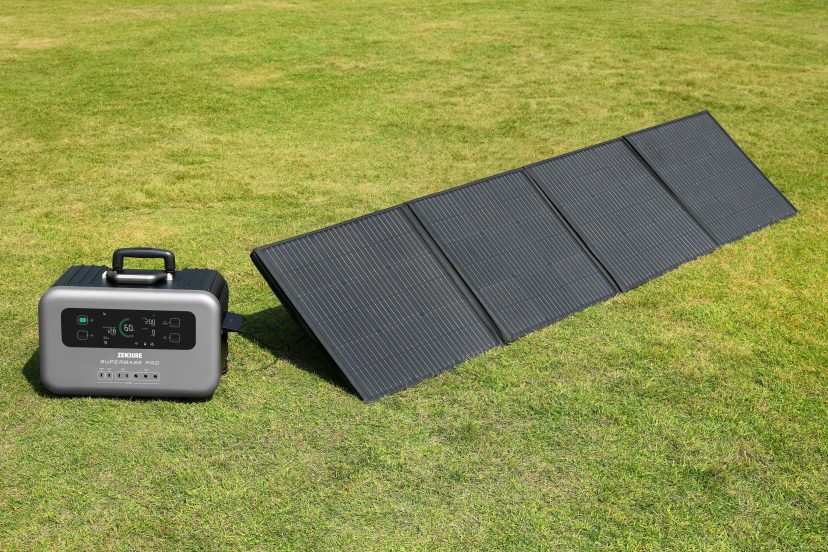
Research-Backed Insights
According to a SnadiSolar article, one of the biggest advantages of solar generators is their sustainable autonomy. These systems convert sunlight directly into electricity, storing it for use during low-light hours—perfect for rural or remote locations where conventional power infrastructure doesn’t reach.
Meanwhile, Greenwashing Index points out that solar generators drastically reduce greenhouse gas emissions compared to fuel-based models, proving that homesteaders can maintain comfort while remaining environmentally responsible.
Furthermore, battery innovations such as LiFePO₄ chemistry have transformed reliability. These cells offer thousands of cycles, translating to years of maintenance-free power storage, a fact confirmed by numerous industry studies and field data.
Conclusion
Investing in the best solar generator for off-grid living is a smart move toward true independence and sustainability. Each watt of solar power you generate brings you closer to self-reliance and away from dependence on external systems. Start by assessing your energy needs, pick a model that fits your homestead, and plan for future growth. Whether you’re powering a home, a root cellar, or essential tools, the right generator transforms how you live off the grid. Let the sun power your freedom, one ray at a time.
Frequently Asked Questions
Q1. Can a solar generator really power an entire off-grid homestead?
Yes—the best solar generator for off-grid living depends on your load: start by totaling watts and daily watt-hours, then size up for surge and allow headroom for expandability.
Q2. How long will a solar generator keep working?
Most lithium-based solar generators last between 10 to 15 years, depending on battery cycles and care. Panels themselves can last over 25 years, making the system a long-term investment.
Q3. What happens during cloudy or rainy days?
During low-light conditions, charging slows down. This is why dual-input charging (solar + AC) or adding extra battery capacity is crucial for consistency. Some units can even recharge via vehicle or wind systems for added flexibility.
Q4. How safe are solar generators compared to gas ones?
Extremely safe. There are no open flames, fumes, or carbon monoxide risks. Solar systems are clean, silent, and eco-friendly—perfect for enclosed spaces or barns.
Q5. Is it worth the cost?
Absolutely. Though initial investment is higher, solar generators have zero fuel costs, minimal upkeep, and long-term savings. Plus, for homesteaders, independence from the grid is priceless.

